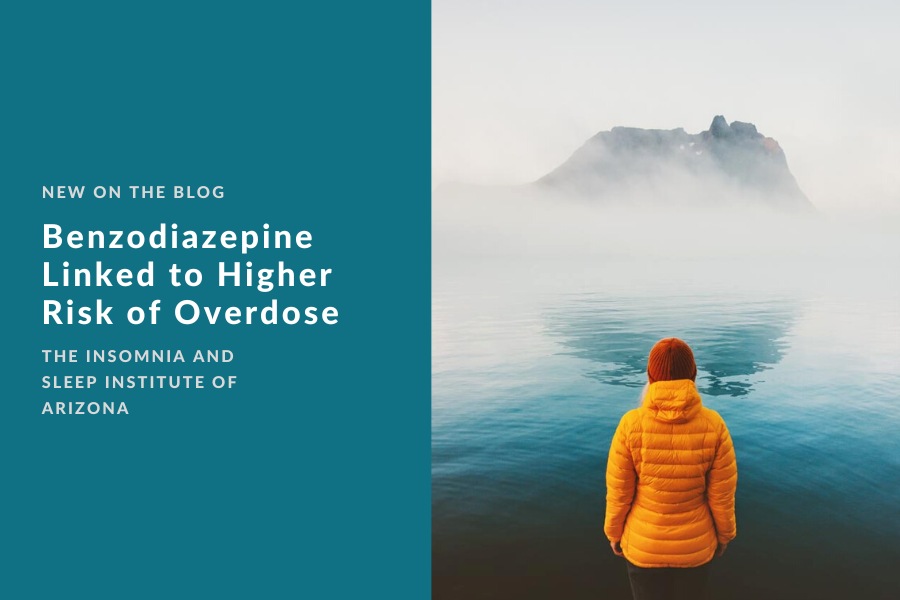Most people will struggle with insomnia at some point in their lives, whether acute (such as with jet lag) or chronic. Those with chronic insomnia have traditionally been prescribed sleep aids or, perhaps more commonly, self-medicate with OTC sleep aids. At The Insomnia and Sleep Institute of Arizona, we are committed to treating all types of sleep disorders—including insomnia—holistically and safely. That is why the gold standard in insomnia management at our clinic is cognitive behavior therapy for insomnia (CBT-I), sometimes coupled with sleep aids prescribed by and supervised by a doctor. In many cases, it is possible to reduce or even eliminate dependency on sleep aids when you work with the experts at the Face of Sleep Medicine in Arizona.
A recent report revealed that benzodiazepine drugs, a common type of sleep aid, are linked to a higher risk of overdose compared to other pharmaceuticals. The researchers at Rutgers University say that teens and young adults who take benzodiazepines, such as the popular drug Xanax (often prescribed for both insomnia and anxiety), face a higher risk of overdosing. This demographic is particularly at risk but, of course, anyone of any age can abuse or overdose on such medications.
What the Study Says
The full report can be found in JAMA Network Open and examines how often young people with insomnia overdose shortly after beginning a sleep aid regimen. The National Institute on Drug Abuse found that benzodiazepines were involved in over 12,000 overdose deaths in 2020. That is a vast increase from 1,135 in 1999 and 6,872 in 2011. Still, the researchers stress that the “risks of drug overdose in youth populations prescribed a benzodiazepine treatment for insomnia was unclear.”
The higher risk for an overdose tends to peak around six months after starting benzodiazepine use. Researchers compared this statistic to other sleep aids including hydroxyzine, trazodone, and z-hypnotics. The Rutgers team says that the risks they seem to have found is an “important safety consideration” for both prescribing physicians and patients. “We hope these results can inform prescribing decisions and encourage close monitoring in this young patient population,” they conclude.
Safe Sleep by the Numbers
Researchers used a commercial claims database that held the data of almost 90,000 people ages 10 – 29 who were privately insured and recently prescribed either benzodiazepine or a comparable sleep aid. They followed cases of overdoses for six months following the onset of treatment. Additionally, they found there was an increased risk in overdose for younger people who were prescribed an opioid along with benzodiazepine—which is not surprising given the opioid epidemic in the country. It is also common for many physician to co-prescribe benzodiazepines with other substances (or for the prescribing physician to be unaware of other current medications).
While the team says additional research is necessary to figure out how benzodiazepine dosage and treatment might be associated with higher overdose instances, these findings are enough to warrant consideration when treating insomnia. In many cases, patients (no matter their age) want a safe, natural solution for their insomnia—particularly when it is chronic. In addition to CBT-I and closely monitored prescriptions from a sleep doctor, there are natural remedies as well, like Sip2Sleep®.
Getting Help for Your Insomnia
Insomnia is a serious medical condition because lack of quality sleep is connected with a myriad of health conditions. Just one night of poor sleep can drastically affect function the next day. Sustained lack of sleep is connected with severe health conditions ranging from an increased risk of stroke to diabetes and cardiovascular conditions. If you or your child has trouble going to sleep and staying asleep, immediately choosing medications may not be the best solution. Instead, work with a sleep expert to create a strategy that is safe, effective, and works for you.
We have unprecedented staffing levels, including a clinical psychologist focused on CBT-I. As an outcome-driven clinic, we know that treatment begin with the right diagnosis—which is why, starting from your consultation, you exclusively work with sleep specialists who can diagnose conditions and inform next steps. To find out more about treatment options for insomnia and other sleep disorders, schedule a consultation today. No referral is necessary. Contact The Insomnia and Sleep Institute by calling the office or, for a faster response, complete the online contact form today.





